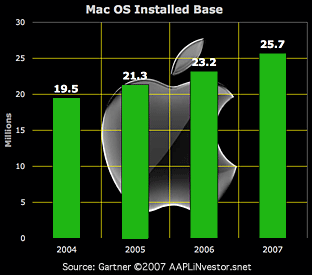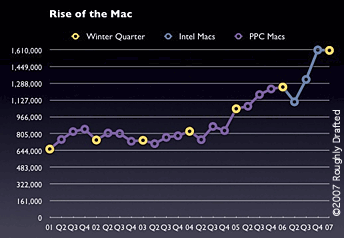With 11 million iPhone users and strong sales of the iPod touch
reported in all markets (except Asia Pacific) in Apple's latest 10K
filing, it is likely that there were around 20 million OS X users
on those platforms at the end of September.
If the average life of a Mac is four years, there are over 25
million Macs in use, again not counting this quarter.

Mac OS Installed Base, 2004 to 2007
Based on out of stock reports after Cyber Monday at Amazon.com,
Target,
and
Walmart, Deutsche Bank analyst Chris Whitmore says the iPod touch
is selling well in a holiday season when retail sales are down and
electronics are doing badly.
The iPhone has moved into new markets, and some of the partner
networks are promoting it strongly. For example, Orange in France is
offering iPhone packages from €99, and O2 in the UK lets you
have a free iPhone if you spend £45 (about $60) per month.
The iPhone and iPod touch could reasonably achieve 10 million sales
between them this quarter.
From Amazon and analyst reports of retail sales, Macs - particularly
the new MacBooks - are also doing well. Sales from those should exceed
2.5 million units.
iPhone + iPod touch + Mac Sales
Over 50 million OS X devices in use by the end of 2008 looks
highly likely - and with a good Christmas, 60 million may be possible.
Obviously, quite a few users have both a Mac and an iPod touch or
iPhone, Macs at work and at home, etc., but there are also families,
schools, and computer labs with multiple users per Mac.
 While the
quoted number of OS X users will depend on how Apple treats these
factors, the number will be a huge leap from the Steve Jobs keynote at
WWDC June 2007 when there were 15 million "Tiger" (Mac OS X 10.4)
+ 5 million "Panther" (10.3) + 2 million older Mac OS users. (Mac OS X
10.5 "Leopard" was released in October 2007.)
While the
quoted number of OS X users will depend on how Apple treats these
factors, the number will be a huge leap from the Steve Jobs keynote at
WWDC June 2007 when there were 15 million "Tiger" (Mac OS X 10.4)
+ 5 million "Panther" (10.3) + 2 million older Mac OS users. (Mac OS X
10.5 "Leopard" was released in October 2007.)
Impact of the Recession
The importance of this rapid expansion of the market is how it
affects the future of programming. The world is in a recession, and the
chances of a rapid recovery do not look good. This time, unlike in
previous downturns, IT departments are likely to not add people or to
downsize. It seems nobody wants to spend more on IT if it doesn't fix a
business problem. This means programmers also will have problems
finding work writing in-house programs for Windows.
When you take into account how well Vista has been received, unless
Windows 7 offers significant cost saving advantages over XP, it will be
adopted slowly by corporates. It is very likely XP will remain the
corporate standard for years to come. So for a new programmer, it will
be harder to find work in a Windows world that is seen to be
contracting and not moving forward technologically.
Programming for OS X
Compare that to the OS X world, where stories of iPhone
programmers earning $150 to $200 an hour are widespread and there are
documented gold rush stories of earning hundreds of thousands of
dollars from a single iPhone app.
Many will at least try out Cocoa, Apple's object-oriented
application program environment. Enough will succeed for good apps to
keep appearing in the App Store and on Macs - and keep OS X
expanding.
In a recession, good news really stands out. A good app on the App
Store can also work as a very effective calling card. It's cheap to put
an app on the App Store and let companies you want to work for have a
copy.
If Apple were to add a student app section to the App Store, it
would raise both the visibility of the students and the schools they
attend. The programmers of the student app of the quarter or month
could receive free invitations to WWDC and possibly similar prizes to
the best OS X student app already featured at WWDC. Increased
visibility for the schools will increase the number and quality of
Cocoa courses taught.
The rapidly increasing number of OS X users across iPhones,
iPod touch, and Macs will lead to an increase in the number of Cocoa
programmers. Cocoa will no longer be a backwater of object oriented
programming.
And when more and more programmers realize that good programs can be
put together more quickly in Cocoa than with their old tools, Apple
will be able to take over sectors of the business market.

Further Reading




